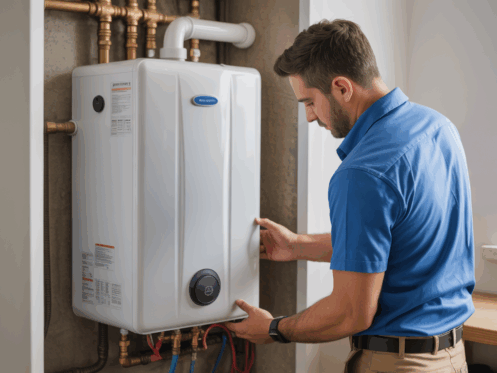Tankless water heaters have gained popularity among homeowners for their efficiency and sleek design. As more people consider this modern solution, it’s crucial to weigh the benefits and potential drawbacks. Here, we explore the pros and cons of tankless water heaters, especially for those in the Greater Austin area and Abilene, where Quality Cooling, Heating & Plumbing offers expert services.
What Are Tankless Water Heaters?
Tankless water heaters, also known as on-demand hot water heaters, differ from traditional models by heating water directly as it flows through the unit. This provides hot water on demand, eliminating the wait associated with tank systems.
The key advantage is their energy efficiency. Unlike traditional heaters that keep a large tank of water hot, tankless models only use energy when you need hot water. For more on energy efficiency comparisons, check out this source.
Pros of Tankless Water Heaters
Here are some reasons why tankless water heaters are a smart choice for homeowners:
- Energy Efficiency and Cost Savings: These heaters are highly energy-efficient, as they heat water only when needed, leading to lower utility bills. Compare tankless and traditional models here.
- Unlimited Hot Water: Enjoy continuous hot water on demand, perfect for busy households.
- Space-Saving Design: Compact and wall-mounted, they save valuable space in your home.
- Environmental Benefits: With a smaller carbon footprint, these heaters are a greener choice. Learn more about their environmental impact here.
Cons of Tankless Water Heaters
Consider these potential downsides before making a decision:
- Higher Initial Cost: The upfront cost for tankless systems can be higher, though they offer long-term savings.
- Water Supply Limitations: In larger homes, they may struggle to supply multiple fixtures at once, affecting water pressure.
- Installation and Maintenance Complexity: Professional installation is often required, and regular maintenance, such as descaling, is necessary. For maintenance tips, visit here.
- Technological Advancements: Ongoing innovations are addressing some of these challenges. Discover more about these advancements here.
Average Life of Water Heater: Tankless vs. Traditional
Here’s how tankless water heaters compare to traditional models in terms of lifespan:
- Tankless Water Heaters: Typically last around 20 years due to the absence of a storage tank, reducing corrosion risk.
- Traditional Water Heaters: Usually last 10 to 15 years, with tanks prone to rust and sediment buildup.
Factors affecting lifespan include:
- Quality of Installation: Proper installation enhances performance and longevity.
- Regular Maintenance: Routine checks and system flushes extend life.
- Water Quality: Hard water can cause scale buildup; water softeners can mitigate this.
Is a Tankless Water Heater Right for You?
To determine if a tankless water heater suits your needs, consider:
- Household Size: Smaller households benefit from on-demand hot water without large tanks, while larger homes may need multiple units.
- Budget: While initial costs are higher, energy savings can offset this over time.
- Existing Plumbing: Your current setup affects installation complexity and cost. Learn more here.
For personalized advice, consult with Quality Cooling, Heating & Plumbing. Our experts can guide you to the best solution for your home.
Summary and Next Steps
Tankless water heaters offer numerous benefits, including energy efficiency and space savings, but come with considerations like higher initial costs and installation complexity.
When deciding, consider your household size, budget, and plumbing setup. For expert guidance and installation, contact Quality Cooling, Heating & Plumbing. We’re here to help you make the best choice for a comfortable and efficient home.


